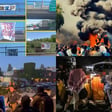
War from Ground Level: A Discussion About Experiencing the War in Ukraine
We're back after a brief summer break!
The war in Ukraine is often, like many conflicts, discussed through the lens of foreign policy and the interests of these entities that we call states. This is not the framing that we simply inherit from media, it is one that the Left globally has embraced just as thoroughly as liberals and conservatives. Discussions become echoes of the Cold War, where massive power blocks collide in some geopolitical game involving huge historical projects.
There are myriad issues with this framing, but we will focus on just one in this episode. This framing has a tragic side effect, it has the tendency to disappear people on the ground living through conflict, and often abandoning them as a result. It has led some on the Left to support the worst authoritarians, right wing religious extremists, and genocidaires, all while abandoning people fighting authoritarianism repeatedly, merely because the states that supports the regime they are fighting are "anti-American".
We want to have a different discussion about war, and about Ukraine; a discussion about what it means to be an anarchist living in a place actively under invasion, facing existential threats, and the threat of immanent arrest or death if you lose. We are joined by Anton from the Solidarity Collectives to talk about the war, how life continues in a warzone, what the war has meant for the anarchist community in Ukraine and the wider region, and how a movement can not just survive, but also actively engage in the situation around them, against all odds.
You can follow the work of Solidarity Collectives here:
https://www.solidaritycollectives.org/en/
https://bsky.app/profile/solcolua.bsky.social





